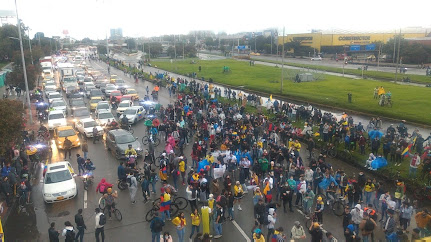[Listen to an audio version of this blog entry here.]
'There are decades where nothing happens, and there are weeks where decades happen.'
That famous observation, attributed, rightly or wrongly, to Vladimir Ilyich Ulyanov — better known as Lenin to most of us — has been used to describe many situations over the years.
 |
| Lame ducks: President Iván Duque & Vice President Marta Lucía Ramírez. (Photo from presidencia.gov.co.) |
Some might be tempted to apply it to what's been happening in Colombia of late.
The truth of it is, however, that despite the ongoing protests — linked, it must be remembered, to a movement that started on 27 November 2019, so not quite a matter of just a few weeks — nothing much has changed in the country, the pandemic effects excepted.
Indeed, so far the protesters' main achievements have been to stop things from happening. No to the proposed tax and health reforms, no to the co-hosting of the Copa América.
What's more, calls for police and military reform have been heard from Colombians since before the new constitution of 1991. Like that of the perennial tax-reform debate that only ever really trims around the edges at best, we're still waiting.
While there does appear to be broad agreement that there's something more lasting to the current protests, that those taking to the streets won't go away without concrete commitments to change, in a country that, officially speaking, displays a deep respect for "due process" through the courts, rapid, radical overhauls are most unlikely.
'There is a Colombian tradition of finding a workable solution to an impasse without completely ripping up the script.'
Of
course, in a number of respects, this is a good thing. Throwing away
the existing rule book when it's not at all clear what would follow
could go disastrously wrong. Nonetheless, there are many who say,
justifiably, that that existing rule book only really serves the
interests of a comfortable minority.
'Hay un camino'
That
being said, there is a Colombian tradition of finding a workable
solution to an impasse without completely ripping up the script. The
Colombian compromise we could call it. (One could argue that the new
constitution of 1991 was the wrong solution at the right time, change
for change's sake.)
I've experienced this compromise for day-to-day affairs while there are also "grander" historical examples (the Frente Nacional,
to name but one). It might require a questionable interpretation of the
rules or the turning of a blind eye but the idea is that all parties
walk away feeling they've achieved something.
For now, for the
current bungling administration headed by President Iván Duque, the hope
must be that it can tap into that old Colombian trait. As Venezuela's
former presidential candidate Henrique Caprile's campaign slogan went,
'hay un camino', there is a way (alas, for him, he's still looking for
that 'way').
It's both a blessing and a curse for Duque that his
term ends in just over a year, August 2022. The blessing, in theory
anyway, is that he can be more flexible in ceding to various demands
safe in the knowledge that they'll get tied up in Colombia's Byznantine
bureaucracy. In that scenario, when he leaves office, he could say:
'Hey, I did try in the end. It's out of my hands now.'
The curse is that it appears the majority of Colombians wish he wasn't president. There is zero trust in him in many quarters.
Furthermore,
the unspectacular but largely positive change Colombia has experienced
over the last couple of decades has now, understandably, only led to a
desire for greater, quicker change amongst its younger citizens.
They know what they want — in a general sense in any case — and they want it now, in a number of weeks, not in a decade or two.
Step forward the Colombian compromise.
_______________________________________________________________
Listen to Wrong Way's Colombia Cast podcast here.
Facebook: Wrong Way Corrigan — The Blog & IQuiz "The Bogotá Pub Quiz".



